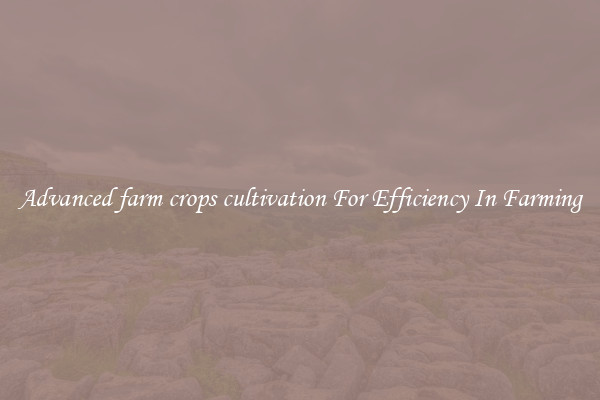Advanced farm crops cultivation For Efficiency In Farming
Advanced Farm Crops Cultivation for Efficiency in Farming

In recent years, advancements in technology have transformed various industries, and the agriculture sector is no exception. As the global population continues to grow, there is an increasing need to produce more food in a sustainable and efficient manner. Advanced farm crops cultivation techniques have emerged as a solution to this challenge, enabling farmers to maximize their yields while minimizing the use of resources. This article will explore some of the key methods and technologies used in advanced farm crops cultivation.
One of the significant advancements in this field is precision farming. Precision farming involves the use of sensors, GPS technology, and data analytics to monitor and manage crops with precision. Farmers can analyze soil conditions, moisture levels, and even track the growth of individual plants through this technology. With this information, they can make data-driven decisions regarding irrigation, fertilization, and pest control, thereby optimizing their resource usage and reducing waste.
Another technique that has gained popularity is vertical farming. Vertical farming involves growing crops in vertically stacked layers using controlled-environment agriculture (CEA) techniques. This method allows for the cultivation of crops in urban areas or areas with limited space. By utilizing vertical space, farmers can grow more crops using less land. Additionally, this system provides greater control over environmental factors such as temperature, light, and humidity, leading to higher crop yields and reduced water usage.
In recent years, genetic engineering and genetically modified organisms (GMOs) have also played a significant role in advancing farm crops cultivation. Genetic modifications enable crops to possess desirable traits such as resistance to pests, diseases, and herbicides, as well as improved yield quality and quantity. GMOs have not only increased crop productivity but also reduced the need for chemical pesticides, benefiting both the environment and human health.
Moreover, advanced farm crops cultivation techniques incorporate the use of drones and robotics. Drones equipped with cameras and sensors can monitor crop health, detect diseases, and identify areas that require immediate attention. By using this technology, farmers can identify issues early on and respond promptly, preventing potential crop losses. Similarly, robots can efficiently perform tasks such as planting, harvesting, and selective spraying, reducing labor costs and increasing productivity.
In conclusion, advanced farm crops cultivation techniques have revolutionized the agriculture industry. Precision farming, vertical farming, genetic engineering, and the use of drones and robots are just a few examples of the technologies available to farmers today. These advancements enable farmers to produce more food while reducing the use of resources, leading to increased efficiency in farming. As the global population continues to rise, investing in these technologies will be crucial to meeting the growing demand for food in a sustainable and responsible manner.

View details

View details

View details

View details








